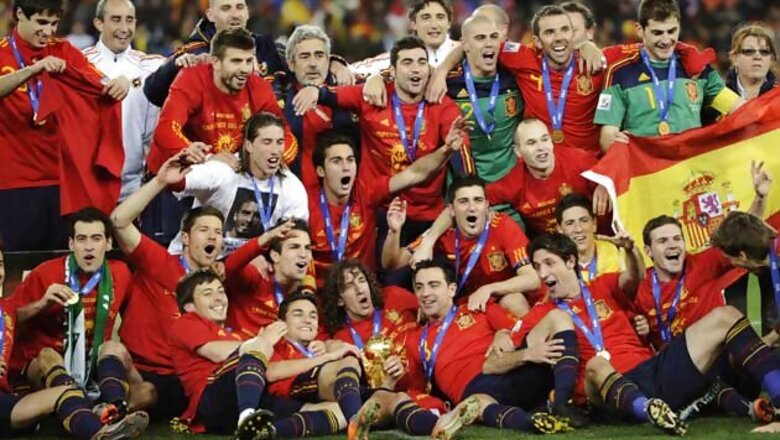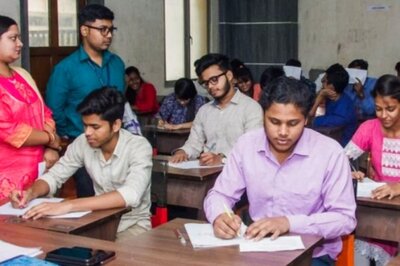
views
Madrid: Spain's World Cup-winning team arrived home from South Africa for a huge celebration Monday, including meetings with the Spanish king and prime minister and an open air bus ride through the city's historic center.
Players landed at Madrid's Barajas airport shortly before 3 p.m. (1300 GMT, 9 a.m. EDT).
Dozens of airport workers cheered from the runway as the plane, flying Spanish flags from cockpit windows, taxied to a stop while car horns could be heard honking in the distance.
A special slogan printed along the fuselage of the Iberia plane read, "Proud of our National Team. Champions."
A roar of delight rose up as team captain and goalkeeper Iker Casillas stepped out from the plane and raised the World Cup.
The crowd then broke into chanting "Campeones, Campeones," meaning "champions."
The players, wearing the team jersey, walked from the plane to a waiting Spanish football federation bus watched on by dozens of journalists.
After resting at a hotel, they will be received by King Juan Carlos in the Royal Palace. Then they head to meet Prime Minister Jose Luis Rodriguez Zapatero.
Monday's highlight is a 5-kilometer (3-mile) bus ride through Madrid and crowds wearing the Spanish flag's bright red and yellow colors.
Several hundred thousand fans were expected to line the streets to celebrate Spain's first World Cup title. Spain beat the Netherlands 1-0 on Sunday in extra time.
The victory appeared to inject a dose of unity in this fractious nation even in regions seeking more autonomy or outright independence. It was also a welcome break from economic gloom and soaring unemployment.
"It was as if this was unfinished business for Spain and so it's been good for everyone," said Soledad Gonzalez, 51, a security guard from Madrid. "I hope that, God willing, finally, the Spanish flag means being Spanish and not being a fascist, as was the case not so long ago," she said.
"It's very important, it helps us forget a lot of things, like the economic crisis, for example, or people's domestic issues," said photographer Javier Sanchez,42, from Madrid.
Some news reports saw the national team as an example to follow.
"It would be good if the collective enthusiasm for the team became a stimulus for Spanish society in the face of the current problems and even that it became the motive to demand that our country should resemble and work like this group of young men," the ABC newspaper said.
Officials said about 75,000 fans celebrated the victory waving the Spanish flag celebrated in Barcelona Sunday night, where more than 1.1 million people protested a day earlier against a Spanish court ruling that their autonomous Catalonia region must remain part of Spain.
Spaniards who partied past midnight to celebrate dragged themselves into work Monday, but were ready to launch the party again after the team's arrival.
Hair salon owner Marisa Dalon stayed up celebrating until her grown children finally arrived home at 3 a.m.
"It is the greatest day imaginable. We are so incredibly proud," beamed Dalon, 42.
Security guard Francisco Delgado made it to work at 6 a.m. after just three hours of sleep.
"I'm so unbelievably proud not just that we won but of how we won, playing clean and in a dignified manner," said Delgado, 49. "The Dutch were tough and very unsporting. We can hold our heads up and I'd even be proud if we had lost because of the class and dignity of our game."
The victory dominated the country's media, with newspapers paying tribute to the first Spanish team to claim football's most prestigious trophy and television stations replaying Andres Iniesta's winning goal over and over.
Under the front page headline "World Champions," leading Spanish newspaper El Pais called the win "an ode to happiness."
Spain "gave an injection of universality, showed its style of football despite those who sneer at it, after an emotional, uncomfortable game against a coarse Netherlands. It succumbed to a rival that was well-versed in the art of the unpredictable, as well as being intoxicating and mature," El Pais said.
The winning goal came with four minutes left in extra time when Iniesta took a pass from Cesc Fabregas and blasted the ball into the net.
"It was poetic justice because football won and football, that marvelous universal folklore, is Iniesta," said the El Mundo newspaper. "The little wizard had to be the one who in minute 116 put the nail in the coffin of the 11 most quarrelsome Dutchmen in history."
Iniesta plays for Barcelona, the club that forms the core of the Spanish team, along with players such as Xavi Hernandez, Gerard Pique and Carlos Puyol. Eight Barcelona players were members of the World Cup-winning squad.


















Comments
0 comment